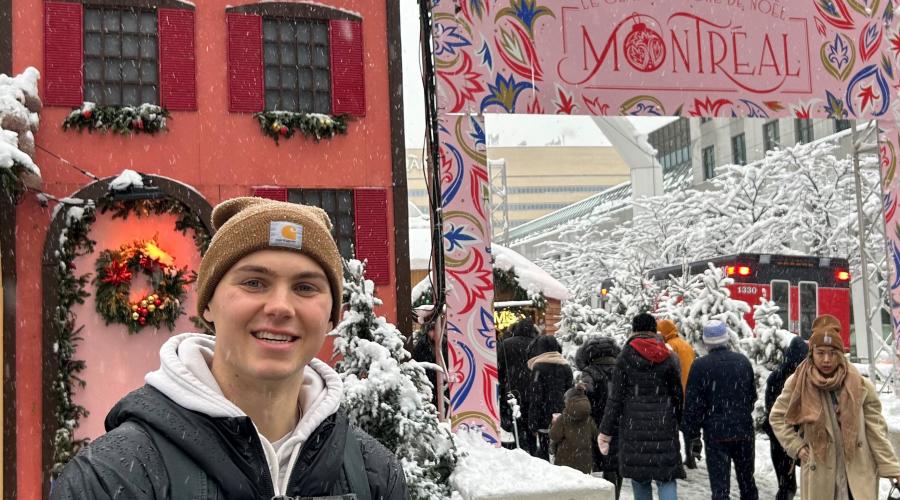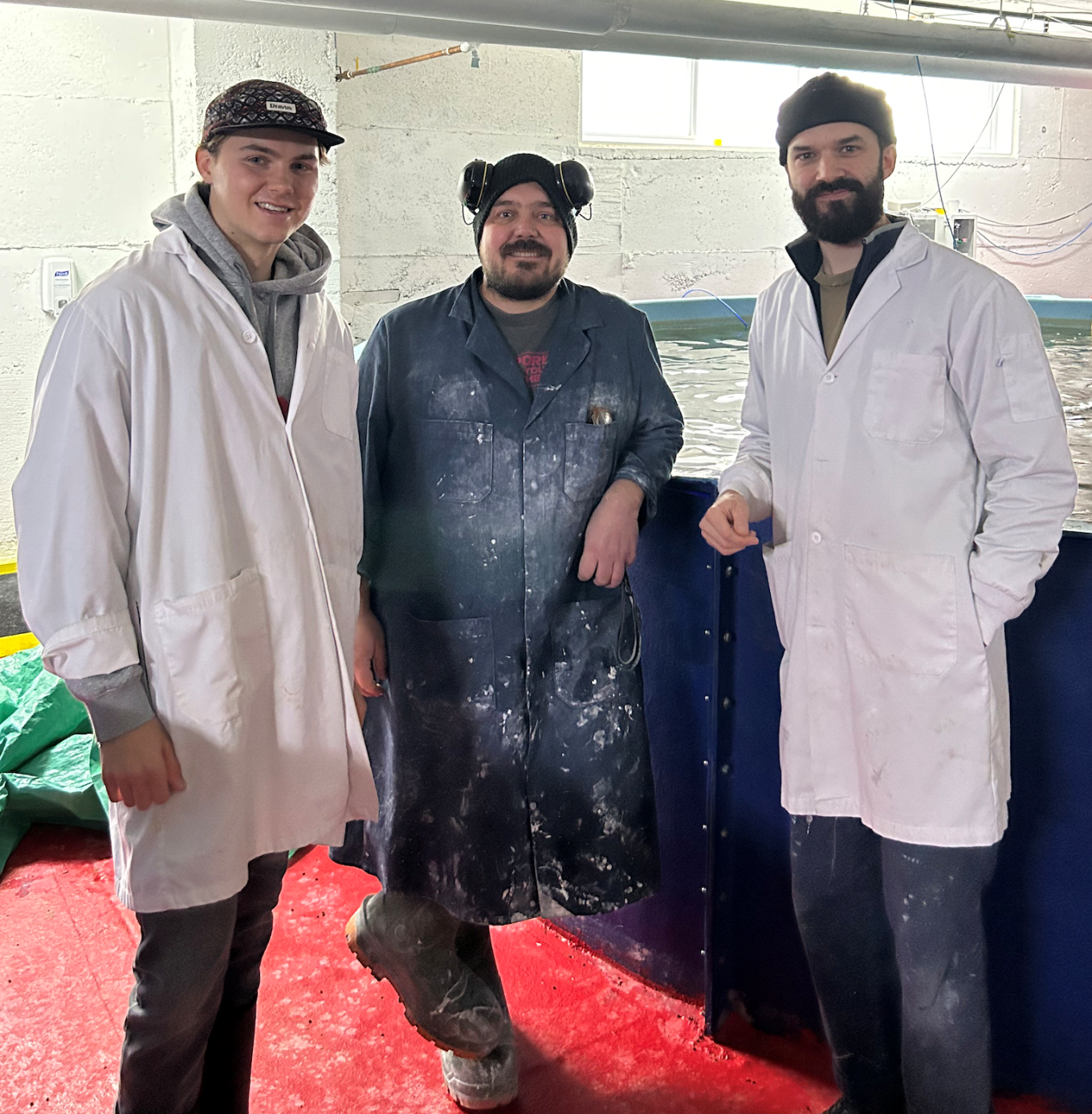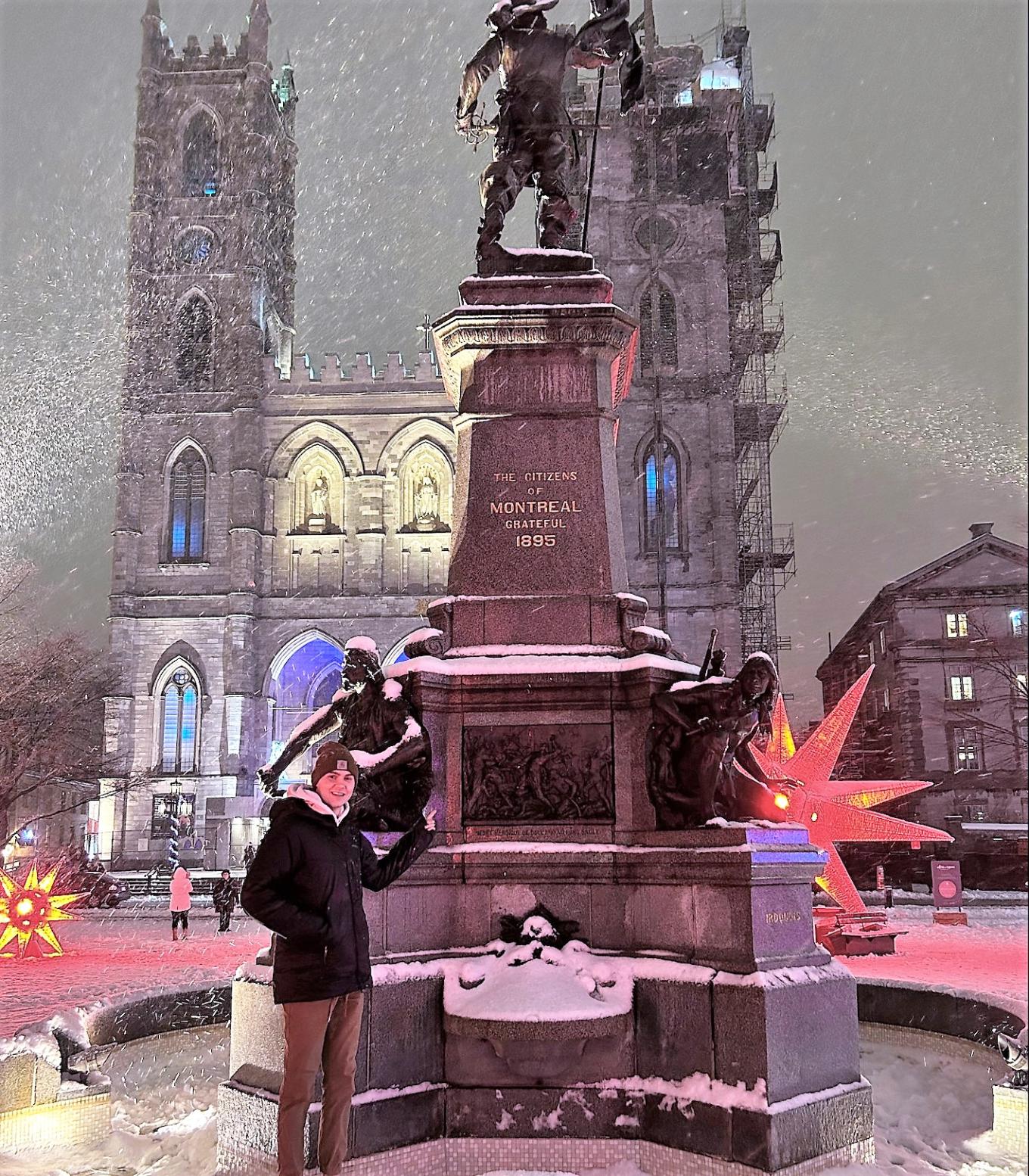
Alex Mocarski
Over the 2022-23 winter break, I had the opportunity to travel to Canada and study how Montreal’s newest urban aquaculture business affects the local economy and sustainable development. Opercule is a small fish farm founded by two college-buddies in 2018. David Dupaul-Chicoine (right) and Nicolas Paquin (center) have reshaped the sourcing of freshwater fish for restaurants throughout the Quebec province by operating an intensive water recirculation system under the city. The inspiration for this research came from my passion for fly-fishing coupled with an interest for small-businesses development. ILR coursework in scaling labor markets as well as six years learning French in the classroom aided in chatting with Opercule’s owners and understanding their business model.

Unlike traditional fish farms, which are built outdoors, Opercule constructed their facility inside and use a recirculatory aquaculture system (RAS). Breeding indoors has multiple advantages including protecting fish from predators and weather changes. The RAS technology additionally provides an advantage in regulating water metrics (pH level, temperature, etc.) as well as improving waste management processes. By coupling the use of an indoor facility and RAS, it has resulted in a dramatically positive effect on fish quality and environmental impact when compared to outdoor practices.
Popularly, farms in the Quebec province kill fish by asphyxiation; Opercule, however, uses stunning by electricity. Stunning places the fish under less amount of stress; within seconds they are unconscious and insensible to pain. On the other hand, fish left to asphyxiate may be alive and suffering for over an hour; building up high amounts of lactic acid in their muscles; thus, increasing the degradation rate and oxidative rancidity of the meat. To further enhance fish quality and reduce detrimental environmental effects, David and Nicolas focus on minimizing the use of marine feed. Wild trout eat fish and aquatic insects, so to feed the char in their system, they would have to go fish in the ocean. Currently, most marine ingredients come from processing plants which treat the fish for human consumption, but some of it comes from the ocean (fish with no commercial value). If, hypothetically, one could replace all marine ingredients, the production would have no impact on the oceans. Opercule’s methods not only pay respect to animal welfare but also benefit meat quality and future sustainable fishing practices.
Another popular result of large-scale aquaculture is crowded and dirty fish-breeding environments; caused by poor waste management. Although this is often true in industrial-scale fish farming, it is the opposite for small indoor practices. As a part of Opercule’s RAS technology, solid waste is removed, collected, and treated to be used as compost. The waste is rich in nutrients and, with some simple processing, can be used as fertilizer. Opercule directly delivers its compost to other nearby agricultural business and co-ops which neighbor their own. These other businesses then, in turn, use it for projects like rooftop gardening and organic vegetable growth. The impacts of Opercule not only benefit the local community, but also promote the development of other sustainable small businesses.
Another particularly unique feature of Opercule’s business model is how they have reduced the compartmentalization of labor. The fish market supply-chain is typically separated into five activities: fishermen, receiving centers, processing plants, corporate buyers, and, finally, the consumer. In addition, there is the activity of transportation between business parts. David and Nicolas manage four of these business activities, including the transportation of the fish to restaurants throughout Montreal; which they do on electric bicycle through a local business partnership with La Roue Libre. By remaining intimate with the supply-chain and not outsourcing very heavily, it has kept practices not only transparent, but also resilient in economically volatile times. In the case of Opercule, reducing the compartmentalization of labor was proven effective during the COVID-19 pandemic. From 2020-2022, supply-chain fragility was exposed, and businesses suffered major disruptions. However, Opercule was not affected as badly due to their size and control over operations. Apart from an annual shipment of Yukon fish eggs, they can manage their entire business within the region of Montreal. The resilience Opercule has shown during the pandemic highlights the strength of small businesses that root themselves within the local community.
In addition to touring David and Nicolas’ facility, I got the chance to explore the wonderful city of Montreal. Reading up about historical fishing practices at the BAnQ (Quebec’s library of congress), sightseeing some beautiful architectural feats, and practicing my French at countless coffee shops are some other memorable moments from this trip.

I would like to express my gratitude to Opercule, Professor Batt and faculty committee, donors, and the ILR International Programs. With their help and support, I was able to have this amazing experience and take another step towards my own career ambitions.
Alex Mocarski '23